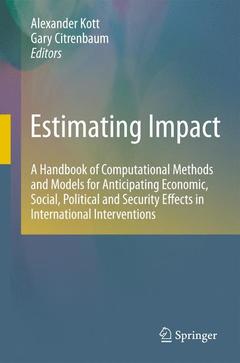Description
Estimating Impact, 2010
A Handbook of Computational Methods and Models for Anticipating Economic, Social, Political and Security Effects in International Interventions
Coordinators: Kott Alexander, Citrenbaum Gary
Language: English
Subjects for Estimating Impact:
Estimating Impact
Publication date: 11-2014
362 p. · 15.5x23.5 cm · Paperback
Publication date: 11-2014
362 p. · 15.5x23.5 cm · Paperback
Estimating Impact
Publication date: 09-2010
362 p. · 15.5x23.5 cm · Hardback
Publication date: 09-2010
362 p. · 15.5x23.5 cm · Hardback
Description
/li>Contents
/li>Comment
/li>
Sociological theories of crime include: theories of strain blame crime on personal stressors; theories of social learning blame crime on its social rewards, and see crime more as an institution in conflict with other institutions rather than as in- vidual deviance; and theories of control look at crime as natural and rewarding, and explore the formation of institutions that control crime. Theorists of corruption generally agree that corruption is an expression of the Patron?Client relationship in which a person with access to resources trades resources with kin and members of the community in exchange for loyalty. Some approaches to modeling crime and corruption do not involve an explicit simulation: rule based systems; Bayesian networks; game theoretic approaches, often based on rational choice theory; and Neoclassical Econometrics, a rational choice-based approach. Simulation-based approaches take into account greater complexities of interacting parts of social phenomena. These include fuzzy cognitive maps and fuzzy rule sets that may incorporate feedback; and agent-based simulation, which can go a step farther by computing new social structures not previously identified in theory. The latter include cognitive agent models, in which agents learn how to perceive their en- ronment and act upon the perceptions of their individual experiences; and reactive agent simulation, which, while less capable than cognitive-agent simulation, is adequate for testing a policy?s effects with existing societal structures. For example, NNL is a cognitive agent model based on the REPAST Simphony toolkit.
Introduction: Judgment and Computation.- Emerging Techniques and Tools.- Politics and Power.- Economics and Markets.- Media and Influence.- Governance and Society.- Groups and Violence.- Insurgency and Security.- Crime and Corruption.- Visualization and Comprehension.- Verification and Validation.- Conclusions: Anticipation and Action.
Focused on "how-to" applied information for technologists & practitioners in the field of military & humanitarian interventions, with examples on how principles can be applied to spheres like business & social circumstances Combines 2 key perspectives: emerging technologies & practical execution of interventions Supports the use of computational aids in politico-social fields that remain suspicious of technology Editors & contributors are leading experts in their respective areas Includes supplementary material: sn.pub/extras
© 2024 LAVOISIER S.A.S.




